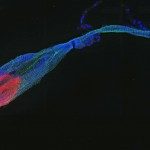Link to Pubmed [PMID] – 22937223
Sci Rep 2012;2:614
Proteins exported by Plasmodium falciparum to the red blood cell (RBC) membrane modify the structural properties of the parasitized RBC (Pf-RBC). Although quasi-static single cell assays show reduced ring-stage Pf-RBCs deformability, the parameters influencing their microcirculatory behavior remain unexplored. Here, we study the dynamic properties of ring-stage Pf-RBCs and the role of the parasite protein Pf155/Ring-Infected Erythrocyte Surface Antigen (RESA). Diffraction phase microscopy revealed RESA-driven decreased Pf-RBCs membrane fluctuations. Microfluidic experiments showed a RESA-dependent reduction in the Pf-RBCs transit velocity, which was potentiated at febrile temperature. In a microspheres filtration system, incubation at febrile temperature impaired traversal of RESA-expressing Pf-RBCs. These results show that RESA influences ring-stage Pf-RBCs microcirculation, an effect that is fever-enhanced. This is the first identification of a parasite factor influencing the dynamic circulation of young asexual Pf-RBCs in physiologically relevant conditions, offering novel possibilities for interventions to reduce parasite survival and pathogenesis in its human host.

